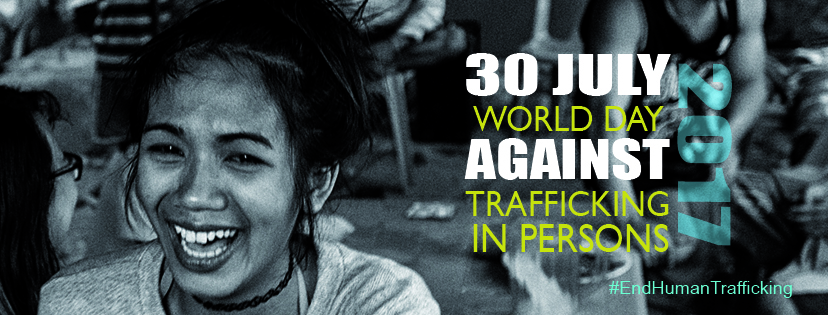World Day against Trafficking in Persons. July 30, 2017.

Many different organisations, committed to working against trafficking in persons, unite in a joint declaration to bring attention to this subject.


Many different organisations, committed to working against trafficking in persons, unite in a joint declaration to bring attention to this subject.
 Now that summer-time travel is at its busiest, UNICEF in the United States of America, alert us to the findings in their Global Study on Sexual Exploitation of Children in Travel and Tourism,
Now that summer-time travel is at its busiest, UNICEF in the United States of America, alert us to the findings in their Global Study on Sexual Exploitation of Children in Travel and Tourism,
The Annual Conference of the National Justice and Peace Network of England and Wales, takes place on 21-23 July at the Hayes Centre, Swanwick, Derbyshire,
In a proactive response to an increase in the incidences of modern slavery, Hertsmere Borough Council recently voted to initiate a human trafficking awareness-raising campaign,
Last month the Vatican hosted its first conference on corruption and organized crime, inviting 50 prosecutors, U.N. officials, bishops and victims of organized crime for a day of talks.

RENATE Core Group member, Marie Hélène Halligon, RGS, shares with us an update on the news from the recent CoE meetings in June,

The Full Report and individual Continent Reports are available at http://www.talithakum.info/news including RENATE President Imelda Poole’s presentation on RENATE.
In her presentation, Begoña speaks about the migration journey and plight of Nigerian women trafficked into prostitution in France; the distinction between ‘smuggling’ and ‘human trafficking’;
In a strategic move to turn the tables on human traffickers, the House of Representatives passed the Frederick Douglass Trafficking Victims Prevention and Protection Re-authorisation Act of 2017 (H.R.

The Scottish Government’s Cabinet Secretary for Justice, Michael Matheson, recently announced that the Reflection Period of support for victims of trafficking in Scotland will increase from 45 to 90 days,

Stay Safe from Slavery is a prevention project that focuses on creating and delivering tailored resources to raise awareness of modern slavery amongst people who are particularly vulnerable to exploitation,

On the 20 of March 2017, I shared some time with the students of Our Lady of Good Council in Elbasan.